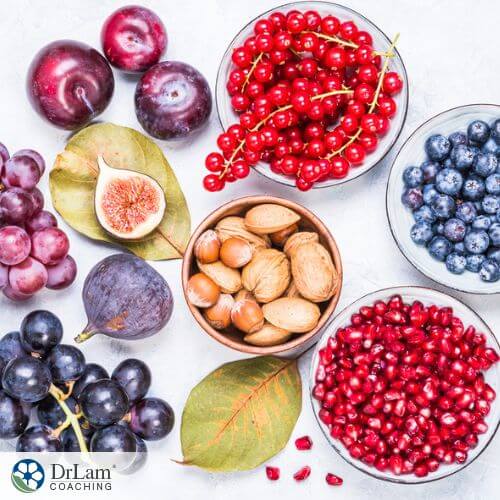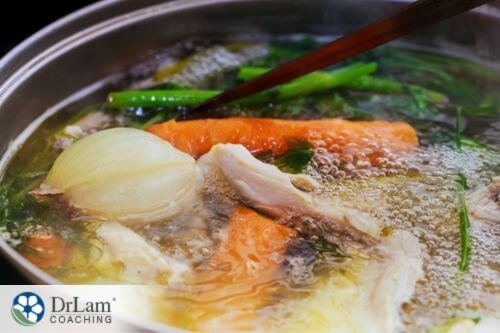 Aside from the primary nutrients, there are many compounds found in food that are beneficial for your health. We commonly think of vitamins, minerals, and fiber, but there are many more compounds that are crucial for your health. One of these lesser-known food compounds is polyphenols. Polyphenols have many important functions in your body. This article will explore what they are, where you can find them, and why they are so important to your health.
Aside from the primary nutrients, there are many compounds found in food that are beneficial for your health. We commonly think of vitamins, minerals, and fiber, but there are many more compounds that are crucial for your health. One of these lesser-known food compounds is polyphenols. Polyphenols have many important functions in your body. This article will explore what they are, where you can find them, and why they are so important to your health.
Polyphenols are a large group of plant-based compounds that are naturally found in food. There are four different types of polyphenols, namely:
Flavonoids make up 60% of polyphenols, while phenolic acid makes up 30%.
Flavonoids include multiple different categories of compounds including:
In addition, there are several compounds within each category. Some common flavonoids that you may have heard of before, for example, include catechins (a flavan-3-o) and quercetin (a flavanol).
Foods rich in flavonoids include:
This is the second largest category of polyphenols after flavonoids and can be found in:
This is a smaller category of polyphenols and is found in whole grains and seeds. Examples of foods high in lignans include:
This is a smaller category within the polyphenol group and includes the compound resveratrol which is commonly found in blueberries, raspberries, grapes, and red wines.
Whilst it's always nice to have a list of different foods that contain polyphenols, you may be wondering which of these foods are the highest in polyphenols. In order of highest to lowest are:
As a result of cellular processes in your body, stress, illness, and environmental pollutants, your body produces free radicals. These free radicals are unstable molecules that can cause damage to your body and increase the risk of cancer and diabetes.
Antioxidants play an important role in your body as they can neutralize free radicals and prevent further damage. Polyphenols are part of this group of antioxidants and can help neutralize free radicals, thus helping to protect the body.
Polyphenols can help to reduce the risk of diabetes by indirectly helping to improve sugar levels. After a meal, your body breaks down the starch components of the food into glucose. This helps to maintain your blood sugar levels. Polyphenols assist with the breakdown of starch. They also help to stimulate the release of the hormone, insulin. This hormone helps to move sugar into your cells helping to keep your blood sugar levels within the normal range.
Studies suggest that a diet rich in polyphenols can help to reduce the risk of diabetes by as much as 57%. Other studies show that this diet can help improve insulin sensitivity and lower fasting sugar levels.
Out of all the polyphenols, the one polyphenol that seems to have the strongest effect on sugar levels from research is anthocyanins which are found in foods that are red, purple, and blue such as blueberries and grapes.
 The antioxidant function of polyphenols not only helps to reduce cell damage but can help to reduce and prevent further inflammation in the body. Long-term inflammation is thought to be a risk factor for heart disease. By reducing inflammation, the risk of heart disease can also be reduced.
The antioxidant function of polyphenols not only helps to reduce cell damage but can help to reduce and prevent further inflammation in the body. Long-term inflammation is thought to be a risk factor for heart disease. By reducing inflammation, the risk of heart disease can also be reduced.
Markers for heart disease include blood pressure and cholesterol. There are two types of cholesterol: LDL is considered the 'bad' cholesterol, and HDL is considered the 'good cholesterol'. It is important to have a higher ratio of HDL to LDL cholesterol. Research shows that polyphenols not only help to reduce blood pressure but can also help to reduce LDL cholesterol and increase HDL cholesterol.
When you bleed, your blood cells (also known as platelets) clump together to form a clot. Whilst this is important, sometimes blood can clot unnecessarily leading to blood clots that can cause strokes and deep vein thrombosis (DVT).
Studies researching the effect of blood clotting in test tubes suggest that polyphenols may reduce the risk of blood clots.
Plant-based diets have been shown to reduce the risk of cancer and one theory why is that plant-based diets are generally high in polyphenols. Research suggests that polyphenols could help to potentially block the growth and development of cancer cells.
Other studies have shown that high levels of polyphenols sometimes do and sometimes do not reduce your risk of breast and prostate cancer. Thus, more research is necessary.
One trait of polyphenols is that, unlike most food compounds that are absorbed in the intestine, polyphenols are broken down in the colon by the gut bacteria. When this happens, it can increase the growth of beneficial bacteria. Polyphenols may also have an anti-bacterial effect against harmful bacteria such as salmonella and E. coli. They can also help to improve symptoms of inflammatory bowel disease (IBD) and peptic ulcer disease (PUD).
Research also suggests that polyphenols can help to improve the survival of probiotics in the gut, helping to improve the ratio of beneficial to harmful bacteria in the body.
Research has also found a link between polyphenols, specifically the polyphenols found in grape juice, cocoa, and Ginkgo biloba, to an improvement in memory as well as concentration. One theory behind this is that they help to improve blood flow to the brain. One study focusing on the use of grape juice in boosting memory found that there was an improvement after 12 weeks.
Recent studies suggest that specific polyphenols can aid in the production of the hormone progesterone. This may help those with a higher ratio of estrogen to progesterone. It can help to balance these hormones. Some polyphenols with this ability include apigenin, found in basil and chamomile, and luteolin, found in onions, carrots, and peppers.
A simple way to include polyphenols in your diet is by consuming different types of whole grains, fruits, and vegetables daily. Try to eat fruits and veggies of every color every day. Different colored fruits and vegetables often correlate to the different types of polyphenols as the flavonoids are responsible for the different colors.
As a simple reference tool, the following colors correspond to the following polyphenols:
Flavanols are another form of polyphenol, and rather than being correlated to a specific color, they are found in the skins of fruits and vegetables. To get this polyphenol in, try to eat the skins of fruits and vegetables where possible. This also adds fiber, which can assist in weight loss and reduce cholesterol levels.
When you consume fats it is important to have unsaturated fats every day. Unsaturated fats include nuts and seeds. These are also rich in polyphenols. They also help to improve inflammation and brain and heart health.
 The way you prepare the food can result in a loss of polyphenols. These include removing the peel or hull and boiling foods for a long time. To preserve the nutrient content, it's best to consume the foods with the hull or peel on when possible. If you boil foods, try not to overboil and use the water involved in the boiling such as in a soup or sauce. Other alternatives to boiling include steaming, baking, and roasting.
The way you prepare the food can result in a loss of polyphenols. These include removing the peel or hull and boiling foods for a long time. To preserve the nutrient content, it's best to consume the foods with the hull or peel on when possible. If you boil foods, try not to overboil and use the water involved in the boiling such as in a soup or sauce. Other alternatives to boiling include steaming, baking, and roasting.
Supplements can be another way of consuming polyphenols. These supplements will generally contain only a few main polyphenols in a concentrated form. But though these can be beneficial, they do have some drawbacks compared to consuming polyphenols found naturally in food.
The main drawback is that the supplements will contain very few polyphenols, whereas food can contain a multitude of different polyphenols. Beans, for example, contain up to nine different polyphenols. Dietary sources of polyphenols also contain a range of different plant compounds such as fiber which work together with the polyphenols to benefit health. If you're looking for a supplement source of polyphenols, PGB-T is a good option as it contains pomegranate, green tea, broccoli, and turmeric extract as key antioxidants beneficial to health.
In addition, the FDA also does not regulate these supplements, so the safety of the supplement and the purity of the ingredients is not always guaranteed.
Whilst polyphenols are beneficial for your health, some food sources of polyphenols also contain antinutrients. Antinutrients consist of a group of compounds that affect the absorption of nutrients in your gut, reducing the amount of nutrients that you receive from food. Individuals with micronutrient deficiencies or consuming large amounts of foods that contain antinutrients may need to be mindful of this.
The most common antinutrients that are found in foods rich in polyphenols are:
You don't need to completely cut these foods out of your diet, but there are a few things you can do to reduce the chances of these antinutrients affecting the absorption of nutrients. These include:
Your body has the ability to cope with short-term stress through your adrenal glands and the NeuroEndoMetabolic (NEM) Stress Response system. In short-term stress, your adrenal glands produce stress hormones such as cortisol to help your body cope with the stress. However, when stress becomes long-term, your adrenal glands can become depleted. When this happens, imbalances within the NEM system start to occur, and this results in Adrenal Fatigue Syndrome (AFS).
There are six circuits of related organ systems within the NEM system, and one of these systems is the Inflammation circuit. This circuit helps to regulate inflammation in the body and consists of the immune system, gastrointestinal tract, and gut microbiome. If an imbalance within this system occurs, the inflammation in your body cannot be regulated and increases. This can result in an array of symptoms that includes aches and pains, frequent bouts of illness, a leaky gut, gut symptoms such as bloating, constipation, and diarrhea as well as sensitivities to food.
There are many remedies to reduce inflammation in the body, and foods high in polyphenols are one of these. They can help to reduce inflammation with their antioxidant abilities and can help to increase the beneficial bacteria in the gut. This can help to strengthen the barrier between the gut and the bloodstream, helping to prevent toxins from being released into the bloodstream. This also lowers inflammation.
 If you are currently experiencing AFS, there are a few aspects of adding high levels of polyphenols to your diet to be aware of.
If you are currently experiencing AFS, there are a few aspects of adding high levels of polyphenols to your diet to be aware of.
During AFS, your body can become incredibly sensitive to any new food products introduced into your diet. This can cause a reaction and delay your recovery from AFS. If you would like to increase your intake of foods rich in polyphenols, start with foods that you have had before. If you would like to try a new food that is rich in polyphenols, chat with your healthcare professional first.
Some foods rich in polyphenols including caffeine and red wine may affect aspects of your health such as heart rate and sleeping patterns. If you are already experiencing unwanted changes in sleep and heart rate patterns, it may be best to try another polyphenol-rich food instead.
If you would like to try any supplements, it's important to remember that they may not be as effective as whole foods. The FDA also does not regulate them and they may cause your body to react negatively. Before taking a polyphenol supplement, chat with your healthcare professional first for guidance.
Polyphenols are a group of compounds that can offer your body numerous benefits to assist in your wellness. The four categories of polyphenols are:
These compounds are available in a wide range of different types of food, and if you consume a rainbow of fruits, veggies, nuts, seeds, and whole grains daily, you will easily be able to get a variety of polyphenols and reap the rewards.
If you'd like more info on incorporating polyphenols into your diet with other health needs, or you'd like more information on foods to combat stress and inflammation, you can call the Dr. Lam team at +1 (626) 571-1234 or click here for a free initial call.
There is a chance that you may experience side effects such as kidney damage and a change in hormones if the dose is too high. This is why it’s important to check with your healthcare provider before starting a course of polyphenol supplements.